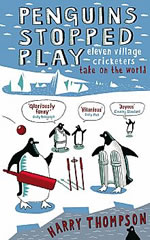Penguins Stopped Play
Eddie Sanders |Published: 2006
Pages: 242
Author: Thompson, Harry
Publisher: John Murray
Rating: 4 stars

Harry Thompson, the brilliantly twisted mind behind ‘Have I Got News For You’ and so many other irreverent BBC comedies, died in November 2005 following an unsuccessful battle against lung cancer. This book, the story of one of English cricket’s famously eccentric clubs, The Captain Scott XI (named after perhaps the greatest runner-up of them all), is Thompson’s legacy to the game he loved.
The Scott XI was born in the winter of 1978, the brainchild of a group of Oxford undergraduates that included Thompson and Marcus Berkmann who would eventually pen ‘Rain Men’, the first novel to cover some of the extraordinary exploits of the ?Scotties?, published a decade ago.
Thompson and Berkmann were boyhood chums who lived for cricket, but constant rebuffs on the grounds of general hopelessness and ‘wetness’ precluded them from ever representing House, School or University. Consequently, in the finest of English traditions, they formed their own club, a club where ability (or rather the lack of it) was less an obstacle, more a positive boon – at least at first.
Early recruits to the club rapidly earning a reputation as ‘the worst in Oxfordshire’ included Hugh Grant, described as ‘A foppish and elegant bat who never scored any runs’, and Ian Hislop who once hilariously hopped over a fence to retrieve a ball, only to end up waist-deep in liquid manure. Sadly, fame took its toll and the pair featured fleetingly in the early days of the club.
The opening chapter bears witness to Thompson valiantly staring down a fearsome vermilion cagoule-wearing New Zealander, oar in hand, desperate to preserve his purple rucksack during an impromptu cricket match on the sea ice in the shadow of Mt Erebus. The spectators include a pod of killer whales and a leopard seal – more leopard than seal – together with hundreds of penguins who eventually ignore all protocol and everything that is Holy by invading the pitch.
The yearning to be ‘part of a normal cricket team’ is a catalyst to the inevitable schism that tears the team apart and sees two clubs emerge – Berkmann’s ‘layabouts’ who depart the scene and Thompson’s keener fellows who set off on a whirlwind three week world tour with the intention of playing a cricket match on each continent, and it is this tour that constitutes the body of the book.
It is perhaps to the detriment of the memory of Harry Thompson that he chooses his final work to seemingly settle a few old scores – perhaps it is because he felt that some things needed to be said and he needed to clear his conscience, but there is an element of futility in a dying man taking such action.
Notwithstanding that small criticism, it is a wonderful read that had me both laughing and crying at the same time on more than one occasion, gut-wrenchingly hilarious and yet at times poignant to the extreme. The final words are those of Harry’s wife Lisa (the pair wed just a few hours before the writer’s untimely death) as she describes how she heard an unmistakeable ?glunk? as one of his friends tossed a cricket ball onto his coffin. ‘Harry would have liked that.’
The Captain Scott XI did once beat a country.
On a Tuesday.


Leave a comment